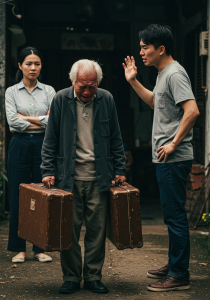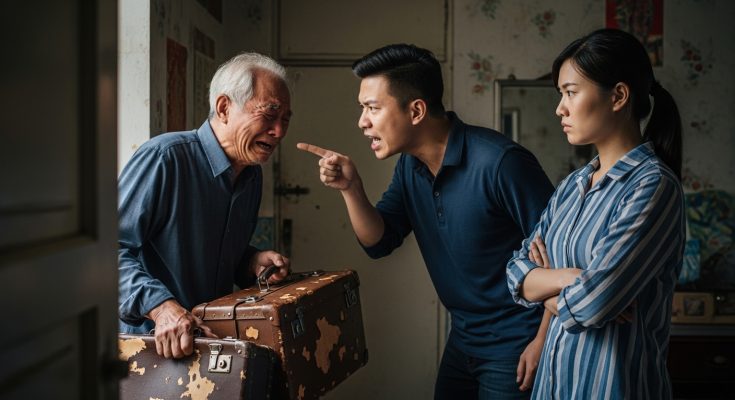The story began on a late winter morning, when Mr. Lâm—a man in his sixties—held in his trembling hands the land title certificate he had just changed to his son’s name. A retired government officer, he had spent his entire life saving and working hard until he finally managed to build a spacious home in the suburbs. That house, he considered his greatest asset—the place for his children and grandchildren to gather, and the shelter he would rely on in his old age.
Out of love for his son, he decided to transfer the land title to his eldest son, Hùng, and his wife. He thought: “If they have the papers, they’ll feel secure in their business, and later on, there will be no disputes. Besides, I believe my son will always remain filial and fulfill his duty as a child.”
But to his shock, the moment they stepped out of the notary’s office, Hùng’s words pierced his heart like a knife:
— “From now on, don’t interfere in this house anymore. This house belongs to my wife and me. There’s no place for you here.”
Mr. Lâm was stunned. He could not believe his ears. The very house he had built with sweat and toil had suddenly become a “stranger’s home” to him.
Right After Transferring the House Title, His Son Drove Him Out—But Little Did They Know He Had 10 Billion Hidden Away…
Before he could even explain, Hùng urged his father to pack a few personal belongings. Mr. Lâm quietly picked up a small bag, stuffing in a few old clothes. Few people knew that inside that bag—alongside trivial items—was a savings book worth over 10 billion đồng, the entirety of his lifelong savings, hidden from everyone.

The cold wind weighed down his steps. He left the house with sorrowful eyes and a choking bitterness in his heart.
Mr. Lâm walked out into the dim twilight. With no place to go, he wandered until he found a roadside teahouse, where he sat blankly for hours. The shopkeeper, seeing his weary figure, assumed he was just a lost old man, occasionally asking:
— “Uncle, where are you headed so late?”
He forced a faint smile:
— “Ah… I’m just looking for a place to stay.”
A few days later, he rented a tiny room at the edge of the village. Barely ten square meters and damp, but to him, it was a shelter. Day by day, he quietly pedaled his bike to the market for a bit of vegetables, sometimes sitting at a street café to watch the crowd pass by.
Strangely, he never touched that 10-billion-dollar savings book. He lived simply, just as before. To outsiders, he looked like a poor, lonely old man—but within him, he carried a secret no one knew.
During countless sleepless nights, Mr. Lâm often asked himself:
— “If my son knew I still had money, would he treat me differently? Or would he just see me as a wallet?”
He did not blame life, nor rush to blame his son. He understood that times change, and so do people’s hearts. But he believed that one day, the truth would surface—and only then would he know who truly loved him, and who merely saw him as a burden.
One day, he visited an old friend—Mr. Thành, once a close colleague. After hearing the story, Thành was both angry and sorrowful:
— “You were right to keep that money. Don’t let him know. When the time comes, use it to live comfortably. Don’t suffer anymore.”
Mr. Lâm gave a faint, bitter smile, though his eyes carried determination. Perhaps he was beginning to realize that in old age, one shouldn’t place blind trust in anyone—not even one’s own children.
Time passed, and word of Mr. Lâm’s situation spread around the village. Some pitied him, others blamed him:
— “He was foolish, transferring everything to his son.”
— “The elderly trust too easily, and betrayal always leaves them broken.”
Meanwhile, back at the house, Hùng and his wife fell into financial crisis. Their business collapsed, debts piled up. They once thought the house would be a “shield,” but now the bank pressed them relentlessly. Hùng began to think of his father—not out of love, but with a suspicion that perhaps he had hidden money somewhere.
One afternoon, Hùng went to his father’s rented room. He knocked on the door, his voice pleading:
— “Dad, I was wrong. I’m sorry. Please, come back home with me. The house isn’t the same without you.”
Mr. Lâm looked at his son, his gaze deep and unreadable. He did not answer immediately. Instead, he quietly poured a cup of tea and slid it across the table. In the cramped little room, the ticking clock echoed, striking at the hearts of both father and son.
In the old wooden cabinet, the 10-billion savings book still lay untouched. He had never spent it, never told a soul about it.

Would he hand it over to help his son through hardship—or keep it, to live out his remaining years in peace?
No one knew the answer—not even himself. The only certainty was that from that moment, their father-son bond stood at a crossroads, torn between love and greed.
The story closed with the image of Mr. Lâm sitting in silence, his hand resting lightly on the teacup, his eyes gazing out the misty window…



